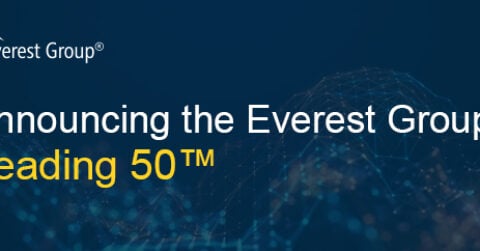As procurement outsourcing market matures, buyers seek innovation, market intelligence; providers invest in technology and talent.
The global multi-process Procurement Outsourcing (PO) market slowed slightly to a single-digit growth rate of nine percent in 2016, reaching US$2.4 billion in size, according to new research from Everest Group. However, with a market penetration of just 12 to 15 percent, procurement outsourcing continues to be an attractive market, one that is experiencing a significant shift from an arbitrage-first to a digital-first model.
The arbitrage-first model, now receding in use, focuses on reducing manpower requirements and standardizing processes, offering buyers the primary value of cost-savings. However, today PO buyers are demanding more, especially better sourcing and category expertise. The fast-growing digital model addresses these demands. It focuses on improving bottom-line performance by contributing innovation, market intelligence and productivity improvements that directly support business objectives.
In this shift to digital-first, technology is a key enabler. Analytics, automation, cloud, mobile, social media, block chain and cognitive/artificial intelligence technologies are being used to create a touchless procurement ecosystem. Providers that are investing in these technologies are experiencing revenue growth of up to 15 percent by expanding existing accounts, gaining share from other players and winning greenfield opportunities.
Talent strategies are also having a major impact on the PO industry as buyers demand significant improvements from service providers in this area. For example, 45 percent of buyers have indicated that the resource pools employed by service providers do not meet their expectations, and almost half of buyers highlight the need for better training and skill enhancement. Furthermore, more than 40 percent of buyers cite attrition as negatively impacting their business. Service providers are responding to this need in two ways: either looking at acquisitions as a one-shot way to gain the necessary talent and capabilities, or investing heavily in training and development of their employees.
“Service providers have a dual imperative to successfully navigate this sea change from arbitration-first to digital-first procurement,” said Megan Weis, vice president, Business Process Services, at Everest Group. “They must adopt new-age technology solutions and also bridge the gap with respect to talent selection and management. Going forward, technology and talent will be the chief factors distinguishing leaders in the procurement services market.”
These results and other findings are explored in a recently published Everest Group report: “Procurement Outsourcing (PO) Annual Report – 2017 – Leap Towards Digital Transformation.“ This report describes the changing dynamics of the PO market, provides a market overview, identifies buyer adoption trends and examines the service provider landscape.
***Download complimentary report abstract here***
Other key findings:
- Emerging markets have seen a robust adoption while there is a slight decline in the adoption rates in maturing markets.
- Industries such as healthcare and pharmaceuticals as well as energy and utilities (E&U) are witnessing an increase in adoption in North America; in APAC, the traditional industries such as manufacturing are witnessing an uptick.
- The market is moving away from a lean six-sigma model to a design thinking approach to usher in more innovation.
- The process scope of contract is expanding as buyers recognize the value of outsourcing judgment-intensive work.
- Multi-country deals declined as growing geopolitical and economic risks restricted buyers from making bold decisions.
- Competitive bidding is on the rise, even when incumbents are involved.
- Offshoring has declined in the wake of global political and economic uncertainty.
- Hybrid pricing models predominate as buyers have moved away from transaction-based pricing.
- Although large businesses represent the majority of PO adopters, adoption by the small to midsize business segment is growing and presents significant opportunities.
- Everest Group has classified 15 PO service providers based on their market success and delivery capabilities:
- Leaders include Accenture, GEP, IBM and Infosys
- Major contenders include Aquanima, Capgemini, Corbus, Genpact, HCL, Optimum Procurement, TCS, Wipro and WNS
- Aspirants include Aegis and Conduent
- Star performers (charting positive movement year on year) include Accenture, GEP and WNS







